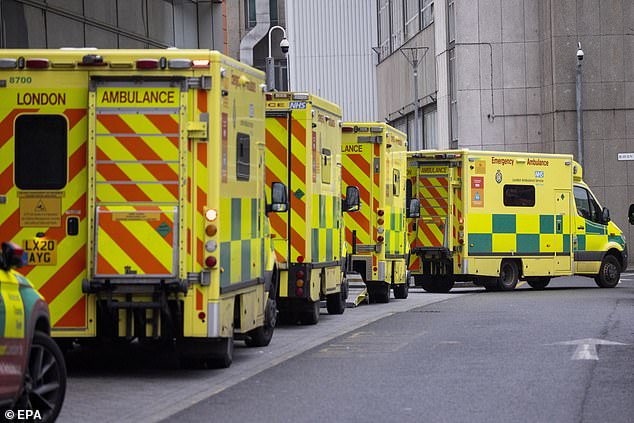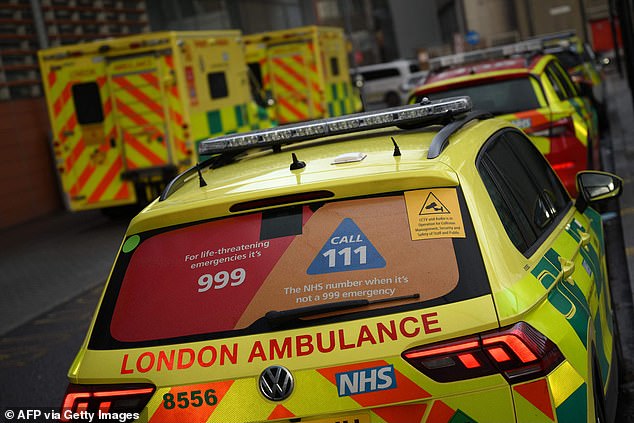BARNEY CALMAN asks the NHS why can it not fix my brother’s broken arm?
>
Just before Christmas, my brother Tom slipped on some ice while loading the boot of his car, fell and broke his arm pretty badly. It was dreadful luck, but such is life. Accidents happen – he’s 47 and otherwise healthy. He’ll live.
I should say at this point that he is not after sympathy. He has allowed me to reveal this because what happened over the following three weeks goes to the heart of a problem that is, I believe, partly responsible for the mess the NHS is in currently. And perhaps it also gives us some insight into a much-needed solution.
After hobbling back indoors, Tom quickly realised the accident was serious: he managed to get his shirt off and his left elbow was visibly misshapen. It was also excruciatingly painful and made ominous grinding noises when he attempted to move it.
After letting us know – he’d been about to set off to a family get-together – he got an Uber to the nearest A&E.

What happened over the following three weeks goes to the heart of a problem that is, I believe, partly responsible for the mess the NHS is in currently. And perhaps it also gives us some insight into a much-needed solution
We’ve all heard the stories by now: emergency departments are beyond crisis point, battling a flu outbreak and other nasty bugs on top of normal winter pressures, striking nurses and paramedics, and staff absences.
Deluged hospitals are warning patients to stay away unless they are dying. Last week some MPs were suggesting that the Army needed to be drafted in, and one dramatically likened the situation at a York hospital as ‘carnage akin to a war zone’. My brother’s experience at his local A&E was no exception – elderly patients were queuing out of the door at 10.30 on a freezing Sunday morning.
As my mum, a retired oncologist who arrived to sit with him, put it: ‘All of humanity was there. There was a woman screaming and passing out on the floor in pain – and probably about four times as many people as there should be in the waiting area.’
And yet, despite all this, the system worked.
Tom was seen by an A&E doctor after about two hours and X-rayed. It turned out he’d dislocated his left elbow, and the lateral condyle of the humerus (the outer bit of the bottom of the upper arm bone) had fractured off completely.
The doctor, assisted by two nurses, reduced the dislocation: Tom was given gas and air to distract him from the agony as they yanked the joint back into place.
It was all over quickly, and they put his arm in a cast.
After a night on a trolley in a side room, he was given a CT scan which confirmed that he would need surgery to reattach the floating fragment of his arm bone with screws and plates.
Then he was discharged.
Tom’s summary, having spent 24 hours on the NHS front line: ‘It was really quite chaotic.’ Yet it all somehow kept running.
After that, though, the wheels came off. On leaving A&E, my brother was told the trauma nurse would ring him in the next day or so to schedule his op the following week. But the call never came.
Aside from being extremely uncomfortable and disabling, fractures like this don’t have to be fixed immediately. However, if you wait more than a few weeks it begins to heal, but out of position, making it trickier to operate later.
In these cases, even after surgery, patients may be left with limited movement, even deformity.
With this at the forefront of his mind, after five days of silence, Tom telephoned the hospital.


We’ve all heard the stories by now: emergency departments are beyond crisis point, battling a flu outbreak and other nasty bugs on top of normal winter pressures, striking nurses and paramedics, and staff absences
The switchboard tried to put him through to various departments, but the phone rang out each time. Eventually he spoke to someone who couldn’t answer any questions, and then put him through to someone else who said ‘a co-ordinator’ would call him back shortly.
That didn’t happen. So he tried calling again, and the phone kept going dead. This maddening dance went on for days.
As Tom put it: ‘I just wanted someone to confirm I was on a list. When I did manage to speak to someone, they were always very pleasant but didn’t seem to have a clue what I should do.’
As I’ve mentioned, my mum is a retired doctor, so she knows a bit about navigating hospital phone systems.
The following week, she tried to help, but had the same problem: phones just rang and rang or went through to answer machines that didn’t take messages. She spoke to someone in the fracture clinic who said ‘a service manager’ would call back in ten minutes and… you guessed it. Nothing.
On December 29, 11 days after his accident, having spent endless hours chasing with no resolution in sight, my brother gave up trying with the NHS.
Instead, he called King’s College Hospital’s private service, and was told to come in for an assessment that afternoon.
A postscript to the story: on the day after he’d booked in with the private hospital, he called the NHS hospital to let them know they didn’t need to worry about him any more. The trauma nurse called him back 30 minutes later. He was apologetic. He’d been off sick, he explained, and there was no one else in the entire hospital to cover for him.
He said they ‘might’ be able to schedule the operation the following week but couldn’t guarantee it.
So Tom decided to press on with the much more expensive option and had the private op two days ago. He’ll be in plaster for another month or so, but in much less pain. He’ll also be £6,000 worse off – but luckily he had savings to plunder.
But many people don’t. What are they doing in situations like that? I dread to think.
A lot has been said recently about why this kind of thing is happening in the £150 billion-a-year NHS.
Unprecedented demand, not enough staff, underfunding, pandemic backlogs, sick elderly people taking up beds due to lack of social care, patients turning up to A&E unnecessarily…
But what I saw in Tom’s case was a lack of basic administration and management.
As The Mail on Sunday’s Health Editor, I speak regularly with doctors and other healthcare staff. I know how hard they work. I have the utmost respect for what they do in impossible situations.
But what hope do they have if the administrative system around them fails to get things organised? When a lone trauma nurse is the only person in a major hospital with such an important role – so that when he’s off there’s no one to call injured patients and arrange vital operations – it’s just bad management.
Managers make up two per cent of the NHS workforce – down from just under four per cent a decade ago. There was a narrative a while back that the NHS was over-managed. ‘Bean-counters,’ they were called by some.
In the private sector, however, managers account for one in ten of the workforce. And I’d argue that, when properly trained in problem-solving, they are absolutely essential to any health service: studies show that even increasing hospital managers from two to three per cent of the workforce led to improvement in patient satisfaction and a 15 per cent reduction in infection rates.
Of course, the challenges the NHS faces are myriad and complex. There’s no one quick fix, but I’d say simply throwing more money at the problem isn’t the answer. It’s how it’s spent that’s the issue.
Doctors I know are incredulous at NHS Trusts advertising for a £115,000-a-year ‘director of lived experience’, or a £40,000-a-year ‘mindfulness lead’ and other ‘equality, diversity and inclusion’ (EDI) roles – 187 of them last year – costing the NHS more than £8 million.
This is just fiddling while Rome burns.
There are some signs that health chiefs have come to their senses: it was reported last week that EDI targets are being slashed.
Perhaps this will allow the NHS to focus its attention on more pressing matters, such as making sure broken arms get fixed.
